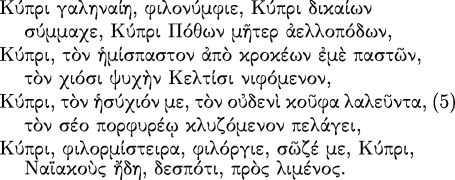
Anth. Grec. pp255-256
Line 1.
-

- "Aphrodite," named after her worship in Cyprus. Here in the vocative.
-
 =
= 
- "calm, gentle"
-

- "loving the bride/groom"
-

- "just, fitting; civilized, well-ordered." Here acting as a noun, "the just"
Line 2.
-

- "allied with, fighting along with." See Sappho 1 for a similar use of this word with Aphrodite.
-

- "longing, desire, yearning, love." Here personified.
-

- "storm-footed, swift-footed"
In the next lines we get a barrage of phrases in
the accusative. We'll not see the verb that goes with these until
line 7. Take the  as a relative pronoun
agreeing with
as a relative pronoun
agreeing with  .
.
Line 3.
-

- "half pulled out; half pulled down"
-

- "saffron-colored"
-

- "bridal chamber"
Note the phonetic echo between
 and
and  .
.
Line 4.
-

- "snow"
-

- "Gallic; Celtic"
-

- "snow", in passive "be snowed on", here more in the sense of "chilled".
 is accusative of respect,
so "chilled to the soul".
is accusative of respect,
so "chilled to the soul".
Line 5.
-
 =
= 
- "still, quiet; at rest; gentle"
-

- "light, nimble; easy; vain, empty"
-

- "prattle, chatter, talk"
The sense of the last clause is that he doesn't gossip.
Line 6.
-

- "dark-gleaming (of the sea); purple; shining, shimmering"
-

- "to be dashed up (by the sea); washed over"
-

- "sea"
Note the phrase  "sea of troubles" which is probably implied here.
"sea of troubles" which is probably implied here.
Line 7.
-

- "she who loves harbors"
-

- "fond of rites/sacrifices/orgies" - the
 usually refers to the rites of Bacchus, thus the orgy associations
we have in English.
usually refers to the rites of Bacchus, thus the orgy associations
we have in English.
-

- "save"; with prepositions of motion "bring safe to" - see
 in the next line
in the next line
Line 8.
-

- "of/for the Naiads" but here "of/for Naias" where 'Naias' is a woman's name.
-

- "now, presently; by this time, already"
-
 =
= 
- "lady, mistress" - used of royalty and goddesses
-

- "harbor; haven"